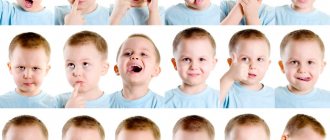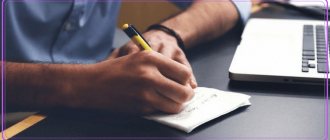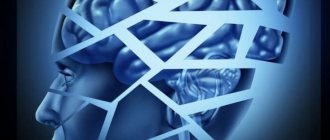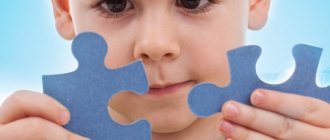What is memory
All events, experiences, feelings and emotions that every person feels during his life are necessarily reflected in his personality.
Memory is our amazing and mysterious property. This is remembering, preserving and reproducing past experiences. Why do we remember snippets of songs from distant childhood, but sometimes we forget what we went to the next room for? Why does our brain store telephone numbers or dates that are no longer relevant? One remembers faces better, the other remembers names. What does this depend on?
It's all about what kind of memory we use.
How, what and when to do to develop memory and attention - I share my personal experience
Without memory we would be people of the moment.
They would not be able to read, write, or comprehend their actions. Because to read a word, you need to remember at least its beginning. Why don't children understand what they read? Their auditory memory is poorly developed. Therefore, the development of memory and attention in preschool children is a very timely and important issue. What about the child’s thinking? It directly depends on his memory. Even more, we can say that the thinking of a small child is his memory. But stuffing a child with facts is not the way to go.
Would you like to tune your child’s memory in such a way as to activate the brain to the maximum?
I always like to quote I. Saunière’s statement that the development of the entire brain comes from the development of the right hemisphere, which includes photographic memory, imagination, and intuition.
What exercises and games need to develop memory in order to establish powerful connections between the right and left hemispheres of the brain? This is precisely the union that all outstanding people have who use the capabilities of the whole brain.
Types of memory
All types can be divided into three groups:
- What a person remembers is whether motor , emotional , verbal-logical or figurative memory is used.
- How he does this (by accident or intentionally) - voluntary or involuntary memory works.
- How long a memory is stored - it is sent to short-term , long-term or operational memory.
Motor (or motor) memory is everything related to movement. Walking, writing, cycling and other skills. If we have learned something once, then it happens as if “automatically”. In children, this type of memory occurs already in the first months of life.
Emotional memory helps to retain feelings and emotions experienced in different situations. The brighter an event is, the better it will be remembered.
Only humans have verbal-logical It is expressed in memorizing thoughts, judgments and is inextricably linked with speech. We do not remember the beginning of our lives precisely because we did not know how to speak.
Figurative memory corresponds to the five senses. Auditory, visual, olfactory, gustatory, tactile - each of us develops them unevenly.
When putting memories into voluntary memory, a person makes certain efforts and techniques. Involuntarily , we remember what interests us. This process happens by itself.
Short-term memory stores information or events from a few seconds to several minutes.
Then the memories either move into long-term memory (and are stored there for months, years or a lifetime) or are forgotten. The operational one is needed for specific actions, to perform one “operation”.
Memory value up to 7 years
Scientists have developed many definitions for memory. But everyone recognizes that this is a complex mental process. Memory is the ability of a child and an adult to receive life experience, retain it and reproduce it.
The life experience of a preschooler includes everything that surrounds him, everything he encounters. Memory develops rapidly up to 7 years of age. This is the so-called natural memory.
A preschooler remembers when he sees an unfamiliar picture or object.
If he saw something out of the ordinary, he begins to talk, remembering something similar from his experience. The thinking of a small child consists of memory, of his life experience.
Therefore, as rich and varied the experience is, so full and strong will be his natural memory.
By the way, the speed of its development cannot be compared with the development of the child’s other abilities. She is the tallest. This is achieved through the ideal interaction of both hemispheres of the brain.
Why are children geniuses from birth? Because up to 3 they have this amazing synchronicity. And those adults who own it are considered geniuses.
What is the minimum you can do to be calm about your child’s future, read our book and get the most effective games.
For the most physiological method of development from birth, follow this link (will open in a new tab).
Why is it important to develop memory in children from an early age?
It’s not for nothing that newborn children are compared to a blank sheet of paper on which nothing has yet been written. After all, memory is memories of past experiences, and babies don’t have them yet. But as they grow up, literally from the first months, babies accumulate different feelings, sensations, abilities and skills, many of which will last a lifetime.
Today, people have come up with many ways to “save” important dates, events, lists, etc.: from convenient planners and checklists to reminder applications on their phones and computers. This is understandable - after all, it is much easier than storing information in your head. This is why it is so important to “pump up” your memory on your own. This will help your child:
- easy to remember facts, events, texts, etc.;
- do well in school;
- think outside the box;
- and even find a way out of difficult life situations!
You just need to remember that “poor” memory in children is often confused with underdeveloped memory. And this can be corrected by regular exercise and training.
Exercises and games
The play form is the best way to achieve any development in a preschooler. With regular exercise, memory will begin to gradually improve, and along with it, the level of intelligence and some personal qualities will increase. It is enough to train several times a week for 30-60 minutes to get results within a couple of months. But even after this, you will need to continue studying to maintain the current level of development.
What games and exercises can be used to develop memory and thinking in preschool age:
- Memorizing cards. Adults show the child several cards (10-15) that he must remember. They can depict animals, plants, letters, etc. After 20 seconds of familiarization with the pictures, the child must name what he saw from memory, despite looking at the cards. To complicate the task, you can ask them to follow the order of the images.
- Hidden things. Together with the child, the parent chooses a toy or thing that the child will look for. After this, the preschooler turns away, closes his eyes, and the adult hides the selected object in the house. The baby's task will be to find the lost item.
- Photographic memory. The child is shown an image, in 30 seconds he must remember it as accurately as possible, and then draw the same one on a blank sheet of paper from memory. You should select pictures that are not too complex so that your child can reproduce them without outside help.
- Adjectives. The adult names several nouns in turn, and the child characterizes each of them with a separate adjective that needs to be written down. Afterwards, the parent reads out all the words, and the child’s task will be to remember what exactly he characterized with this adjective.
- A few words. The adult comes up with pairs of words connected by one characteristic (spoon-food, sofa-rest, book-reading, etc.), and calls them to the child three times in a row. The baby should try to remember them, because... on the fourth repetition, the parent will name only the first words of these pairs, and the second will need to be recalled.
- Combinations of words. The parent calls the child words, starting with one, and then increases their number each time. He names them until the child makes a mistake. And the baby’s task is to immediately repeat all the spoken words. It is advisable to select them so that the connection between them is only conditional. To simplify checking, it is recommended to write down long combinations on a piece of paper.
- Finding differences. You need to find 2 almost identical pictures, in which there will be several subtle differences. These are exactly what the preschooler will need to find. Parents experienced in using a PC can create such images from one themselves using special programs.
- Minor changes. The baby is shown a set of small objects, after which he must turn away. At this time, the adult removes one of the elements, which will change the picture of what he saw. The child will be required to determine what exactly is missing. Such a game can be applied not only to a set of objects, but also to the appearance of the person present or the situation in the room.
- Associations. The parent gives the preschooler any object (toy, clothes, electronics, etc.), and his task will be to compile as detailed a description as possible and come up with associations. This game is suitable for younger ages and will perfectly develop memory and attentiveness. To complicate the task, you can not give the thing in your hands, but simply name it.
- Repetition of movements. The adult shows the baby certain movements with his body, after which he will have to repeat them in the correct sequence. It is advisable to play with pleasant music turned on.
- Tactile sensations. Parents blindfold the baby and give the object into his hands or simply put it in a bag. The child’s task will be to determine by touch what exactly he is touching. It is recommended to use things that are most difficult to recognize.
- Memories. The child's task is to remember the sound, smell or taste of any food. You can also ask him to remember the sequence of exactly how he put on his clothes in the morning.
You can choose any option, but the preschooler must like it. There are many other exercises for memory development, but the ones mentioned above are the most effective. Among others, you can use the game “Shop”, known to everyone since childhood. It affects the development of memory, thinking and fantasy.
Features of memory development at different ages
Age-related features of memory development can be divided into several periods.
Up to 2 years
A child's memory begins to develop at about three months. He learns to remember the faces and voices of his relatives, examines the objects and toys around him. It is very important already during this period to comment on actions, name objects, while playing with the child. This will train both the baby’s visual and auditory memory.
Of all types, motor memory initially develops; by the end of the first year of life it reaches the level that is necessary for the acquisition of speech.
Around six months, the child also develops emotional memory. He can cry only when he sees something that previously upset him. And, of course, the brightest moments are remembered best.
At one and a half to two years, figurative memories also arise - auditory, gustatory and other ideas.
From 2 to 6 years
Time for rapid formation and strengthening of memory. Memorization at this age occurs automatically. Children easily and with great interest grasp new knowledge. This is the period of “whys” who are curious about everything.
From about three years of age, long-term memory actively develops. The child involuntarily remembers everything that was very emotional for him. This is the most fertile time when you can use your child’s imagination by training the skill of retelling and composing stories.
Information with a plot is best retained in memory. Moreover, everything is stored in short-term memory, but with regular repetition, memories will form long-term memory. If you influence different senses, then knowledge will be absorbed even faster and better!
From 6 to 12 years
Long-term memory becomes better during this period. Already before school, children are capable of voluntary memorization; they understand that they need to try to remember what they are asked. But, as before, it is easier to retain knowledge that is interesting.
After 12 years
Teenagers 12 years of age and older have brains that function like adults. Memory develops only when new knowledge and experience are acquired and retained. Therefore, it is important to devote time not only to school, but also to various hobbies, useful hobbies and sports.
Development of memory in schoolchildren
When a child enters first grade, he immediately finds himself in an unfamiliar environment. From the first days of school, he has to memorize large amounts of information. As the student gets older, the workload will increase. If he does not have good memory and attention, then studying will be more and more difficult for him every year. That is why it is necessary to pay special attention to the development of memory in a child over 7 years old.
It is important to teach him to remain focused on lessons and to voluntarily remember the information that he receives from the teacher’s lectures and textbook texts. To do this, you need to regularly perform various exercises that are aimed at improving the skills of perception and assimilation of new knowledge. No less useful for memory development will be reading and discussing books, memorizing poems, writing summaries - that is, those tasks that the school curriculum already includes.
Sometimes such simple training is enough to improve memory and attention. But if it is still not easy for a child to cope with the academic load and remember large amounts of material, then he needs additional training.
Umnasia memory courses
On our website, your child will be able not only to exercise on a simulator or participate in Olympiads, but also to improve such an important skill as “MEMORY”. The program consists of four courses: 1. “How to learn poetry quickly and well”; 2. “How to remember foreign words, names and faces”; 3. “How to quickly and correctly remember information”; 4. “Practical mnemonics.”
Choose the most interesting one or upgrade all types of memory! (when purchasing a set of 2 or 4 courses you will receive a nice gift)
Memory development in children 6-13 years old
We develop the ability to quickly memorize and retain a large amount of necessary information for a long time
find out more









